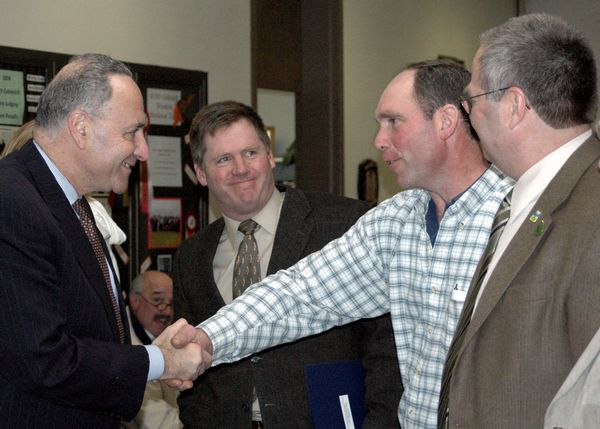Subscriptions
Menu
Advertisements
Schumer promises help to dairy farmers
2/18/2009 |
By Patsy Nicosia |

Senator Charles Schumer got an earful from dairy farmers Monday.
But that’s just what he was looking for.
In the extreme price fluctuations that are becoming the norm, what farmers will be getting for their milk in 2009 is projected to drop by a third.
Senator Schumer told about 75 of them at SUNY Cobleskill that by his calculations, that’s about a $651,000 hit to Schoharie County’s economy—a month.
And though at times he seemed to have more answers than questions, that’s what the session was all about:
Farmers’ answers to what John Stanton of Cobleskill said goes far beyond an emergency.
“He hit the nail right on the head,” Mr. Stanton said of another farmer’s call for a reactivated Northeast Dairy Compact that would price milk regionally.
“It’s not an emergency. It’s a crisis.”
Crisis or emergency, everyone agreed the situation needs immediate action.
Sarah Blood-Szentmiklosy, also of Cobleskill, asked if federal stimulus money could be used to help hold off farm foreclosures—an idea Senator Schumer promised to look into.
Senator Schumer’s own ideas include asking the Credit Commodity Corporation to increase its purchase of milk powder and working to increase exports to countries like India, both of which reduce supply, and adding the cost of packaging milk back into federal supports.
The beauty of them, he said, is that they can all be done immediately, without legislation.
“Hopefully, we can get back to a dairy compact, but that’s down the road,” he said. “I know the squeeze you’re in.”
Tunis Sweetman, who milks 175 cows in Orange County, said the prices projected for ’09 could finally be the “knockout punch.”
Farmers need an emergency price support increase, he said, like the $30 million in assistance then-Governor Elliot Spitzer okayed two years ago, when the situation was bad, but not this bad.
“We need to check to see if any of the stimulus money could be used [for something like that],” Congressman Schumer said as his aides took notes.
Senator Schumer reminded the crowd that he helped pass the Milk Income Loss Contract program, which provides dairymen with money when their price drops below a benchmark, in 2006.
Though that’s welcome—and needed—dairymen said it’s still not enough; many of them are still paying off things like fertilizer and feed they bought in ’08.
“Forty-five percent doesn’t pay 100 percent of the bills,” said one man.
“We don’t like handouts. We’d prefer to do it on our own. But we need help,” said another. “We are in a terrible situation.”
Senator Schumer said he expects to see banking move back toward community banks and Farm Service Agency.
But dairyman Carl Peterson pointed out that with milk prices plummeting, so is his his equity, namely, the value of his cows.
And no one in his right mind is going to give out loans when that’s happening, he said.
Senator Schumer reminded the group that there’s a new administration in Washington.
“And that matters,” he said.
According to Farm Bureau figures, the county’s 78 farms average 85 cows each; the range, however, is from as few as 20 to several hundred.
The crowd urged the Congressman not to support programs that pit farmers against each other—large against small—but Senator Schumer said they need to keep in mind what type of agriculture legislators and taxpayers want to support.
“Let’s be realistic,” he said. “People want to help the small farms.”









